List of ministers of Greyfriars Kirk
The minister of Greyfriars Kirk is a position within the Church of Scotland's Presbytery of Edinburgh. The current minister of Greyfriars Kirk is Richard Frazer, who was admitted in 2003.[1]
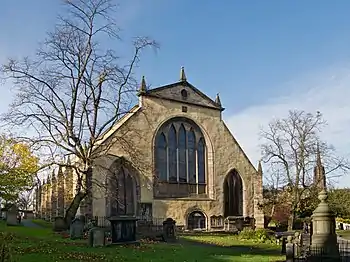
Greyfriars originated in 1598, when Robert Rollock and Peter Hewat were appointed ministers of the South West Parish of Edinburgh, then meeting in the Upper Tolbooth portion of St Giles’.[2] The charge of Greyfriars continued with two ministers until 1840, when St John's Church, Victoria Street, was erected and the last minister of the second charge, Thomas Guthrie became the first minister of the new church.[3] New Greyfriars was erected in 1722 and occupied the western half of the kirk. It was a sole charge served by one minister.[4] In 1929, the congregations of Old and New Greyfriars united under one minister.[5] Both churches were burgh churches, meaning that the town council held the right to nominate the churches' ministers.[6]
Since the establishment of the South-West Parish in 1598, 75 ministers have served the congregation: 40 in Old Greyfriars, 30 in New Greyfriars, and five in the united charge. Three ministers of Old Greyfriars were elected moderator of the General Assembly of the Church of Scotland during their incumbencies: George Kay in 1755,[7] William Robertson in 1763,[8] John Inglis in 1804.[9] Two ministers of New Greyfriars were elcted to this role during their incumbencies: Robert Henry in 1774[10] and James Nicoll Ogilvie in 1918.[11] In 2003, Alison Elliot, an elder of Greyfriars, was elected to serve as moderator of the 2004 General Assembly. Elliot was the first woman moderator and the first lay person to hold the office since George Buchanan in 1567.[12] Other notable ministers of Greyfriars include the Covenanters, Robert Douglas, Robert Traill, and Gilbert Rule; the statesman, William Carstares; the philanthropist, Thomas Guthrie; and the liturgical reformer, Robert Lee.
Old Greyfriars
The first congregation of Greyfriars began as the South West Parish of Edinburgh, which met in the Upper Tolbooth portion of St Giles'. In 1620, the congregation moved to the newly-built Greyfriars Kirk. The designation Old Greyfriars was adopted after the erection of New Greyfriars in the western half of the Greyfriars building in 1722.[2]
The congregation was served by two ministers until 1840, when St John's Church on Victoria Street was erected and the minister of the collegiate charge, Thomas Guthrie, became the first minister of the new church.[3] Old Greyfriars was a burgh church of the city of Edinburgh, meaning that, until the abolition of patronage in the Church of Scotland in 1874, the town council held the right to nominate the churches' ministers.[6]
Ministers of the first charge
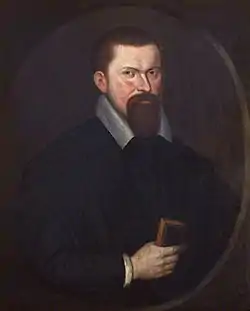
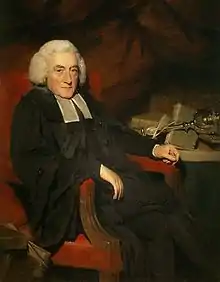
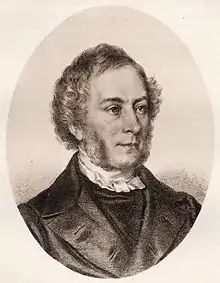
| From | Until | Incumbent | Notes |
|---|---|---|---|
| 1598 | 1599 | Robert Rollock | Previously a minister of Edinburgh; admitted, 18 April 1598; died in office, 8 January 1599.[2][13] |
| 1599 | 1610 | Peter Hewat | Translated from the second charge; appointed, 16 January 1599; removed to Little Kirk, 1610.[2][13] |
| 1614 | 1641 | Andrew Ramsay | Admitted, 28 April 1614; translated to Old Kirk[lower-alpha 1], 1640 or 1641.[15][13] |
| 1642 | 1647 | George Gillespie | Translated from Wemyss; admitted 23 September 1642; translated to the High Kirk, after September 1647.[15][16] |
| 1649 | 1662 | Robert Traill | Translated form Elie; admitted, 23 March 1649; imprisoned for ten months in Edinburgh Castle for engaging in a new Remonstrance, 23 August 1660; exiled by the Privy Council for high treason, 11 December 1662.[15][16] |
| 1662 | Robert Douglas | Translated from the East Kirk[lower-alpha 2] and admitted, 2 June 1662; deprived for rejecting episcopacy, 1 October 1662.[16][18] | |
| 1662 | 1688[19] | John Robertson | Translated from Dysart; admitted, 6 November 1662; appointed almoner to Charles II, 24 March 1681; died, 11 January 1691.[16][20] |
| 1689 | 1701 | Gilbert Rule | Called from a congregation in Dublin, 7 December 1688; admitted, 24 July 1689; appointed principal of the University of Edinburgh, 1690; died in office, 7 June 1701.[20][21] |
| 1702 | 1729 | James Hart | Translated from Ratho; admitted, 20 September 1702; appointed almoner to George I, August 1726; died in office, 10 June 1729.[21][22] |
| 1730 | 1736 | William Brown | Translated from Lady Yester's and admitted, 23 July 1730; died in office, 23 March 1736.[21][22] |
| 1736 | 1745 | William Robertson | Translated from Lady Yester's and admitted, 10 October 1736; died in office, 16 November 1745.[21][22] |
| 1747 | 1760 | James Stevenson | Translated from New Greyfriars and admitted, 24 December 1747; died in office, 17 July 1760.[21][8] |
| 1761 | 1793 | William Robertson | Translated and admitted from Lady Yester's, 26 November 1761; appointed principal of the University of Edinburgh, 1762; elected moderator of the General Assembly, 26 May 1763; appointed Historiographer Royal, 6 August 1764; died in office, 11 June 1793.[8][23] |
| 1794 | 1799 | James Finlayson | Translated from Lady Yester's; admitted, 9 January 1794; translated to the High Kirk, 14 March 1799.[23][9] |
| 1799 | 1834 | John Inglis | Translated from Tibbermore and admitted, 17 October 1799; elected moderator of the General Assembly, 17 May 1804; appointed dean of the Chapel Royal, 23 February 1810; died in office, 2 January 1834.[23][9] |
| 1834 | 1843 | John Sym | Translated from Sprouston and admitted, 24 September 1834; joined the Free Church, 1843.[23][9] |
| 1843 | 1868 | Robert Lee | Translated from Campsie and admitted, 9 November 1843; dean of the Chapel Royal, 1846; died in office, 14 March 1868.[24][25] |
| 1868 | 1876 | Robert Wallace | Translated from Trinity, Edinburgh, and admitted, 26 December 1868; demitted to become editor of the Scotsman, 1 August 1876.[24][26] |
| 1877 | 1909 | John Glasse | Ordained, 21 March 1877; resigned, 13 October 1909.[24][3] |
| 1910 | 1916 | Alexander Brown Grant | Translated from Ecclesmachan and admitted, 10 May 1910; translated to Rosneath, 1916.[24][3] |
| 1917 | 1928 | Samuel Dunlop | Translated from Kilpatrick Irongray; admitted, 1917; died in office, 1928.[24] |
| In 1929, the charges of Old and New Greyfriars were united.[5] | |||
Ministers of the second charge
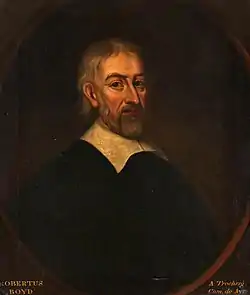
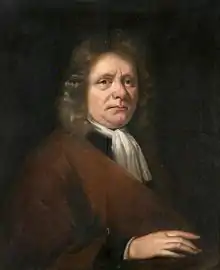
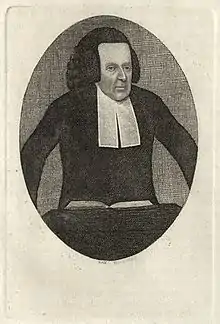
| From | Until | Incumbent | Notes |
|---|---|---|---|
| 1598 | 1599 | Peter Hewat | Translated from Colinton; admitted as a minister of Edinburgh before 31 January 1597; readmitted, 18 April 1598; tanslated to the first charge, 1599.[3][13] |
| 1620 | 1622 | Patrick Sands | Principal of the University of Edinburgh; appointed, 1 December 1620; demitted, August 1622.[13][3] |
| 1622 | 1626 | Robert Boyd | Principal of the University of Edinburgh; elected, 18 October 1622; translated to Paisley, 1626.[27][13] |
| 1626[19] | John Duncanson | Appointed, 16 August 1626.[27][13] | |
| 1630 | 1637 | James Fairlie | Professor of Divinity at the University of Edinburgh; admitted, 17 November 1630; elected to the Bishopric of Argyll and demitted, 28 July 1637.[27][13] |
| 1644 | 1660 | Mungo Law | Translated from the second charge of Dysart and admitted, 27 March 1644; taken prisoner by the English Army at Alyth, 28 August 1651; returned, January 1653; died in office, February 1660.[16][27] |
| 1664 | 1669 | David Stirling | Translated from Foulden; elected, 25 May 1664; demitted, 1669.[16][27] |
| 1669 | 1672 | Alexander Ramsay | Translated from Auchinleck; elected, 8 May 1669; translated to the High Kirk, 1672.[16][27] |
| 1672 | 1674 | Alexander Irving | Translated from West Kilbride and collated,[lower-alpha 3] 12 December 1672; demitted Whitsunday, 1674.[16][27] |
| 1674 | 1681 | Alexander Ramsay | Retranslated from the High Kirk; appointed, 14 June 1674; translated to the Old Kirk,[lower-alpha 1] 1681.[16][28] |
| 1681 | 1687 | Alexander Malcolm | Translated from Newbattle; instituted, 31 March 1681; translated to the Tron Kirk, 1687.[16][28] |
| 1687 | 1691 | James Hutchison | Translated from North Leith; elected, 11 August 1687; deposed "for contumacy", 1691.[16][28] |
| 1693 | 1702 | John Hamilton | Translated from Cramond and admitted, 1693; died in office, 17 October 1702.[21][28] |
| 1704 | 1707 | William Carstares | Principal of the University of Edinburgh; admitted, 8 November 1704; translated to the High Kirk, 28 December 1707.[21][28] |
| 1711 | 1715 | Matthew Wood | Translated from Leslie; admitted, 18 March 1711; translated to the Tron Kirk, 16 January 1715.[21][28] |
| 1721 | 1732 | William Millar | Translated from Lady Yester's; admitted, 22 January 1721; appointed dean of the Chapel Royal, 1727; died in office, 18 May 1732.[21][28] |
| 1732 | 1749 | John Hepburn | Translated from New Greyfriars and admitted, 14 December 1732; appointed almoner to George II, 13 February 1737; died in office, 29 April 1749.[21][28] |
| 1750 | 1754 | Robert Hamilton | Translated from Lady Yester's and admitted, 6 December 1750; appointed Professor of Divinity at the University of Edinburgh and demitted, 6 February 1754.[21][28] |
| 1754 | 1766 | George Kay | Translated from New Greyfriars and admitted, 11 October 1754; elected moderator of the General Assembly, 24 May 1755; died in office, 10 April 1766.[23][7] |
| 1767 | 1803 | John Erskine | Translated from New Greyfriars and admitted, 9 July 1767; died in office, 19 January 1803.[7][23] |
| 1804 | 1837 | Robert Anderson | Translated from Trinity College Kirk and admitted, 12 January 1804; died in office, 24 January 1837.[29][23] |
| 1837 | 1840 | Thomas Guthrie | Translated from Arbirlot; admitted, 21 September 1837; translated to St John's Church, 28 October 1840.[29][23] |
| On the erection of St John's Church, the charge of Old Greyfriars was uncollegiated.[3] | |||
New Greyfriars
After an explosion destroyed part of Greyfriars in 1718, the town council decided to rebuild the church to accommodate two congregations. The western half of the church was occupied by New Greyfriars, which opened on 31 December 1722. In its earliest days, the congregation was also known as Wester Greyfriars.[24]
Like Old Greyfriars, New Greyfriars was a burgh church and, prior to the abolition of patronage in the Church of Scotland in 1874, the town council held the right to nominated the minister.[6] Unlike Old Greyfriars, the congregation was a sole charge served by one minister. The town council often appointed promising ministers to the sole charge of New Greyfriars on the understanding that they would be promoted to one of the city’s two-charge churches soon afterwards. For this reason, many ministers of New Greyfriars served relatively short incumbencies.[4]

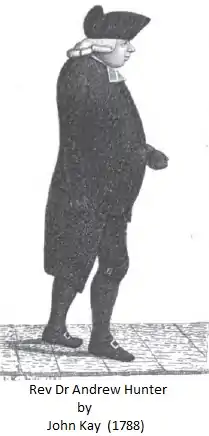
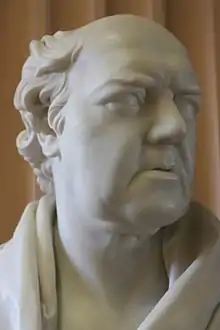
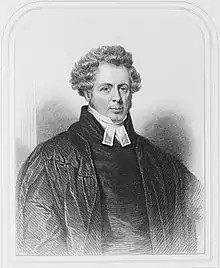
| From | Until | Incumbent | Notes |
|---|---|---|---|
| 1723 | 1732 | John Hepburn | Translated from Torryburn; admitted, 3 October 1723; translated to Old Greyfriars, 28 June 1732.[4][30] |
| 1732 | 1733 | John Glen | Translated from Stichill; admitted, 14 December 1732; translated to the New North Kirk,[lower-alpha 4] 22 November 1733.[4][30] |
| 1733 | 1738 | Robert Wallace | Translated from Moffat; admitted, 22 November 1733; translated to the New North Kirk,[lower-alpha 4] 30 August 1738.[4][30] |
| 1739 | 1744 | William Wishart | Minister of Scottish Church, Founders' Hall, London; appointed, 7 February 1739; translated to the Tron Kirk, 25 July 1744.[30][34] |
| 1745 | 1747 | James Stevenson | Translated from the second charge of South Leith; admitted, 20 June 1745; translated to Old Greyfriars, 24 December, 1747.[30][34] |
| 1747 | 1751 | Frederick Carmichael | Translated from Inveresk and admitted, 24 December 1747; died in office, 17 October 1751.[30][34] |
| 1752 | 1754 | George Kay | Translated from St Cuthbert's; admitted, 26 October 1752; translated to Old Greyfriars, 11 October 1754.[30][34] |
| 1754 | 1758 | Robert Dick | Translated from Lanark; admitted, 11 October 1754; translated to the Old Kirk,[lower-alpha 1] 21 June 1758.[30][34] |
| 1758 | 1767 | John Erskine | Translated from Culross; admitted, 15 June 1758; translated to Old Greyfriars, 9 July 1767.[34][10] |
| 1767 | 1768 | James Brown | Translated from Melrose; admitted, 9 July 1767; translated to the New North Kirk,[lower-alpha 4] 24 November 1768.[34][10] |
| 1768 | 1776 | Robert Henry | Minister of the High Meeting, Berwick-upon-Tweed; admitted, 24 November 1768; elected moderator of the General Assembly, 1774; translated to the Old Kirk,[lower-alpha 1] 19 December 1776.[34][10] |
| 1776 | 1779 | John Kemp | Translated from Trinity Gask, Perthshire; admitted, 19 December 1776; translated to the Tolbooth Kirk,[lower-alpha 5] 25 November 1779.[34][10] |
| 1779 | 1786 | Andrew Hunter | Translated from the New Church, Dumfries; elected Professor of Divinity at the University of Edinburgh; admitted, 25 November 1779; translated to the Tron Kirk, 2 April 1786.[34][10] |
| 1787 | 1789 | William Martin | Translated from Gargunnock and admitted, 22 February 1787; died in office, 10 February 1789.[34][10] |
| 1789 | 1791 | Henry Grieve | Translated from Dalkeith; admitted, 22 July 1789; translated to the Old Kirk,[lower-alpha 1] 27 April 1791.[34][10] |
| 1791 | 1793 | John Scotland | Translated from Linlithgow; admitted, 13 October 1791; died in office, 3 May 1792.[34][10] |
| 1792 | 1799 | George Husband Baird | Translated from Dunkeld; admitted, 15 November 1792; translated to the New North Kirk,[lower-alpha 4] 10 January 1799.[34][10] |
| 1799 | 1800 | Andrew Brown | Translated from Lochmaben; admitted, 18 October 1799; translated to the Old Kirk,[lower-alpha 1] 24 July 1800.[34][10] |
| 1800 | 1802 | John Thomson | Translated from Markinch; admitted, 18 October 1800; translated to the New North Kirk,[lower-alpha 4] 16 December 1802.[34][10] |
| 1803 | 1809 | Alexander Brunton | Transalted from Bolton; admitted, 16 May 1810; translated to the Tron Kirk, 23 November 1809.[10][11] |
| 1810 | 1814 | Andrew Mitchell Thomson | Translated from the East Kirk, Perth; admitted, 16 May 1810; translated to St George’s, Edinburgh, 16 June 1814.[10][11] |
| 1814 | 1822 | John Thomson | Translated from the New North Kirk[lower-alpha 4] and readmitted, 20 October 1814; died in office, 17 February 1822.[10][11] |
| 1822 | 1829 | William Muir | St George’s, Glasgow; admitted, 12 September 1822; translated to St Stephen’s, Edinburgh, 26 February 1829.[11][36] |
| 1829 | 1838 | Daniel Wilkie | Translated from Yester; admitted, 13 August 1829; died in office, 29 November 1838.[11][36] |
| 1839 | 1843 | James Julius Wood | Translated from the first charge of Stirling and admitted, 1839; joined the Free Church while on leave for ill health, 1843.[11][36] |
| 1843 | 1882 | William Robertson | Translated from Logie, Bridge of Allan, and admitted, 21 December 1843; died in office, 21 February 1882.[11][37] |
| 1882 | 1889 | Henry Conway | Translated from Rubislaw, Aberdeen, and admitted, 1882; appointed Professor of Church History at the University of Aberdeen and resigned, 30 October 1889.[11][38] |
| 1890 | 1905 | Robert Stewart | Translated from Jedburgh and admitted, 8 May 1890; died in office, 1 May 1905.[11][38] |
| 1905 | 1919 | James Nicoll Ogilvie | Senior chaplain in Madras Presidency; admitted 26 September 1905; elected moderator of the General Assembly, 1918; demitted, 1919.[11] |
| 1919 | 1929 | William Wallace Dunlop Gardiner | Translated from St Madoes; admitted, 1919; became first minister of the united charge, 1929.[11] |
| In 1929, the charges of Old and New Greyfriars were united.[5] | |||
Greyfriars
After the death of Samuel Dunlop in 1928, no new minister was appointed to Old Greyfriars and the charges of Old and New Greyfriars were united as Greyfriars with William Wallace Dunlop Gardiner, the last minister of New Greyfriars, becoming the first minister of the united congregation.[5] The partition between Old and New Greyfriars was demolished and the church was restored as one sanctuary between 1932 and 1938 under the architect Henry F. Kerr.[39]
Lady Yester's Kirk united with Greyfriars in 1938 and, after Gardiner's departure in 1940, Greyfriars and the New North Kirk united in 1941; Duncan William Park Strang, the last minister of the New North Kirk, became minister of Greyfriars.[40]
When Highland, Tolbooth, St John's united with Greyfriars in 1979, Ewen Angus MacLean, the last minister of Highland, Tolbooth, St John's, became minister of the united charge, which adopted the name Greyfriars, Tolbooth, and Highland Kirk.[41] After Greyfriars, Highland, Tolbooth united with Kirk o' Field Parish Church in 2013, the name reverted to "Greyfriars".[42]
| From | Until | Incumbent | Notes |
|---|---|---|---|
| 1929 | 1940 | William Wallace Dunlop Gardiner | Previously minister of New Greyfriars; admitted, 1929; translated to Caddonfoot, 1940.[43] |
| 1941 | 1948 | Duncan William Park Strang | Previously minister of the New North Kirk; admitted, 1941; translated to translated to Strone and Ardentinny, 1948.[33] |
| 1949 | 1978 | Robert Stuart Louden | Translated from Dailly and admitted, 14 July 1949; demitted, 1978.[33] |
| 1979 | 1982 | Ewen Angus MacLean | Previously minister of Highland, Tolbooth, St John's; admitted, 1979; demitted, 1982.[44][42] |
| 1983 | 2002 | David Mackay Beckett | Translated from Clark Memorial, Largs, and admitted, 9 February 1983; demitted, 2002.[44][45] |
| 2003 | present | Richard Frazer | Translated from St Machar's Cathedral, Old Aberdeen; admitted, 2003.[1] |
References
Notes
- The Old Kirk congregation occupied the central section of St Giles' until its suppression in 1860.[14]
- The "East Kirk" was a name for the congregation meeting in the eastern portion of St Giles', it became known as the High Kirk.[17]
- "Collated" was the episcopal term for "admitted".[27]
- The New North Kirk (also known as "Haddo's Hole Kirk" and the "Little Kirk") met in the north-west portion of St Giles' from 1699 until it vacated St Giles' in 1880, by which time it was known as "West St Giles'".[31] At the Disruption of 1843, the minister and a significant number of the congregation formed New North Free Church, which joined the United Free Church in 1900 and the Church of Scotland in 1929, becoming the "New North Kirk".[32] This congregation united with Greyfriars in 1941.[33]
- The Tolbooth Kirk occupied the south-west portion of St Giles' until its relocation to a new church in 1843.[35]
Citations
- "Our Mission". grassmarketmission.org. Retrieved 17 August 2020.
- Scott 1915, p. 37.
- Scott 1915, p. 44.
- Dunlop 1988, p. 85.
- Dunlop 1988, p. 88.
- Dunlop 1988, pp. 24-27.
- Scott 1915, p. 47.
- Scott 1915, p. 41.
- Scott 1915, p. 42.
- Scott 1915, p. 34.
- Dunlop 1988, p. 87.
- "Jennifer McRae: Alison Elliot, b. 1948. Moderator Elect of the Church of Scotland". nationalgalleries.org. Retrieved 18 August 2020.
- Dunlop 1988, p. 80.
- Dunlop 1988, p. 423.
- Scott 1915, p. 38.
- Dunlop 1988, p. 81.
- Scott 1915, p. 48.
- Scott 1915, pp. 38-39.
- Bryce 1912, p. 158.
- Scott 1915, p. 39.
- Dunlop 1988, p. 82.
- Scott 1915, p. 40.
- Dunlop 1988, p. 83.
- Dunlop 1988, p. 84.
- Scott 1915, p. 43.
- Scott 1915, pp. 43-44.
- Scott 1915, p. 45.
- Scott 1915, p. 46.
- Scott 1915, p. 48.
- Scott 1915, p. 33.
- Scott 1915, pp. 142-143.
- Dunlop 1988, p. 92.
- Dunlop 1988, p. 93.
- Dunlop 1988, p. 86.
- Scott 1915, pp. 117-118.
- Scott 1915, p. 35.
- Scott 1915, pp. 35-36.
- Scott 1915, p. 36.
- Steele 1993, p. 8.
- Dunlop 1988, pp. 91, 93.
- Dunlop 1988, p. 106.
- "Gaelic Worship". greyfriarskirk. Retrieved 17 August 2020.
- Dunlop 1988, pp. 88, 91.
- Dunlop 1988, p. 107.
- "Rev David Beckett". churchservicesociety.org. Retrieved 17 August 2020.
Bibliography
- Bryce, William Moir (1912). History of the Old Greyfriars' Church Edinburgh. Edinburgh: William Green and Sons. Retrieved 18 August 2020.
- Dunlop, A. Ian (1988). The Kirks of Edinburgh: 1560-1984. Scottish Record Society. ISBN 0-902054-10-4
- Steele, Alan (1993). The Kirk of the Greyfriars, Edinburgh. Society of Friends of the Kirk of the Greyfriars. ISBN 0-9521115-0-0
- Scott, Hew (1915). Fasti Ecclesiae Scoticanae: The Succession of Ministers in the Church of Scotland from the Reformation. 1. Edinburgh: Oliver and Boyd. Retrieved 18 August 2020.